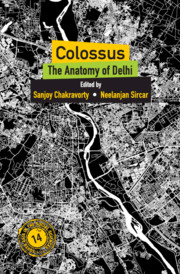Statistical Appendix
Published online by Cambridge University Press: 31 July 2021
Summary
The Center for the Advanced Study of India–National Capital Region (CASI–NCR) Survey is a social survey of approximately 5,500 households living in the National Capital Territory (NCT) of Delhi and its surrounding region—together, the NCR. The demand for the survey came from the paucity of data (or insufficiently dense data) on India's urban areas like Delhi to make nuanced social claims. Other high-quality surveys, specifically the Indian Human Development Survey (IHDS) and the National Sample Survey (NSS), have much smaller sample sizes in the urban areas of the NCR as compared to the CASI–NCR Survey.
The CASI–NCR Survey collected data on a breadth of issues in order to provide comprehensive information on the lives of residents in the NCR. The survey includes a roster collecting basic demographic information, other basic household information, and separate modules for education of children in the household, access to services and benefits, gender and marriage, caste/ religious practices, and commuting and migration. Results from these modules are reported throughout the book.
Components of the Survey
Upon gaining permission to survey the household, the enumerator (that is, surveyor) coded some basic infrastructural information about the household and surrounding area, in particular the quality of the house (kuccha/pucca) and the quality of the approach road to the home. After this, the enumerator moved to the respondent portion of the survey (the method of respondent selection is detailed in the section “Sampling Households”).
Household and Education Rosters
The enumerator carried out a household roster exercise. First, basic demographic information was collected about each household member (for example, age, sex , marital status, relation to the head of the household), as well as location of birth and year and reason the person migrated to the NCR if the individual was born out of the region. Information about primary and secondary occupations, as well as educational status and attainment, was recorded for each member (which serves as the basis for Chapter 10). We also asked about forms of identification—driver's license, Aadhaar card, passport—and a formal bank account for each member.Certain pieces of information were only applicable to some of the household members.
For those aged 18 and above, we ascertained whether they were on the local voter list.
- Type
- Chapter
- Information
- ColossusThe Anatomy of Delhi, pp. 383 - 395Publisher: Cambridge University PressPrint publication year: 2021



